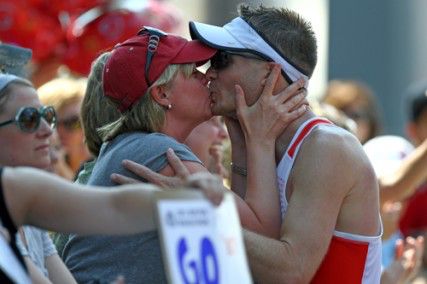
Boston Marathon participants ran through temperatures above 80 degrees on Monday, a factor that deterred many runners from even entering the race.
Of the participants who picked up their bid this weekend, 427 did not show up to the starting line, said Marc Davis, the communications director for the Boston Athletic Association.
“The majority of that, we can assume, is based on a weather-related reason,” he said.
The temperature rose from 71 degrees at 9 a.m. in Hopkinton, where the marathon starts, to 84 degrees in Boston by 3 p.m.
A few days before the race, the BAA warned runners of heat “higher than normal temperatures on the course,” according to one BAA email.
On Saturday, the BAA issued a warm weather advisory, which recommended that those not “highly fit” or those with medical conditions should not run the race.
The advisory said inexperienced runners and those who have only trained in cool environments should not run. The “very fit athletes who decide to run” should run slowly and take walking breaks, according to the advisory.

“This will not be a day to run a personal best,” according to the advisory. “If you choose to run, run safely above all else. Speed can kill.”
One day before the race, Davis said the BAA was encouraging runners to take extra precautions, hydrate properly, listen to their bodies and not run if they are not comfortable with the expected projections of weather.
“We’ve extended that message a little bit more aggressively to our waivered and charity runners who are not as experienced as our full-fledged qualified runners,” he said.
Toward the end of the race, Davis said the BAA was happy to work with Boston Mayor Thomas Menino’s office, the organizing committee and everyone in between to prepare for the extreme weather.

“We’re happy with the way things went,” he said. “We feel that people did listen to our message about if they are going to run, run slowly, take care of yourself, hydrate and have fun today.”
The 427 people who did not show up to the race are eligible to be contacted for deferment for next year’s race, Davis said, although deferment is only a placeholder for the 2013 marathon and not a free entry.
This is the first year the BAA has offered deferment for weather-related conditions, Davis said.
“Not only do they not have to qualify again – they also bypass a five minute per age group – improvement that we’re installing for next year’s race,” he said.
Standing in Kenmore Square close to the finish in the afternoon, Anastasia Kaloyanides, the coach for the Northeastern University Triathlon Team, said the group had five men and two women running the race.
“I was really worried about [the heat] but so far everyone’s been doing great,” she said. “We’ve gotten word that almost every student has hit the halfway mark, we just have one more left who hasn’t hit the halfway yet but we know he hit the 10K.”
Kaloyanides said the biggest thing she told the runners was to hydrate and listen to their bodies.
By the end of Monday, 75 runners were transported to local hospitals and about 2,200 were treated in medical tents, according to WBZ-TV.


















































































































